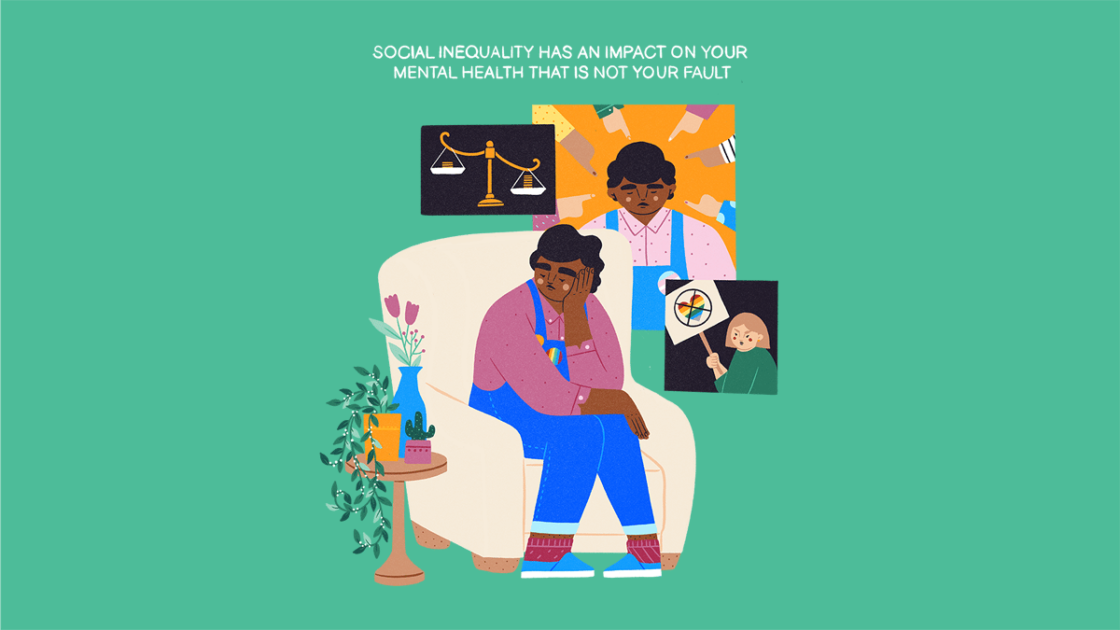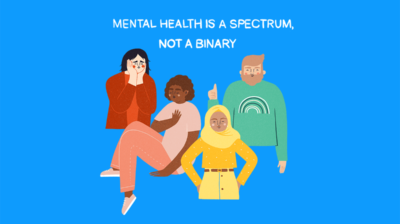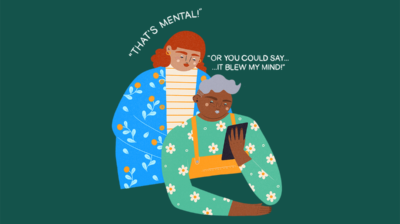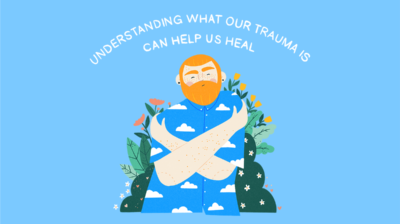How social inequality can affect your mental health
Your mental health is impacted by the social conditions around you.

The quality of your mental health can be affected by a wide range of factors. These factors can impact your mental health in positive or negative ways. Some increase your risk of experiencing mental health difficulties, while others decrease this risk substantially. Some factors can be psychological, including your self-esteem and how well you cope with stress, while other factors can be experiences like traumatic life events. Another important factor that can shape your mental health is your social environment, which can give rise to social inequality.
What is social inequality?
Not everyone in society has equal access to the resources that they need to live happy and healthy lives. When a resource within society is shared unevenly or unfairly, this gives rise to social inequality. Social inequalities often follow patterns that can be traced back to how people are grouped together in society. This means that you can be more or less likely to experience disadvantage based on factors like your ethnicity, ability, appearance, religion, gender, age, sexual orientation, socio-economic group. Experiencing social inequalities increases your risk of many common mental health conditions. People with mental health conditions who are experiencing social inequalities are also more likely to experience more negative consequences from their condition.
What is a social environment?
You might be curious about the types of social environments that can lead to social inequality. Your social environment includes the conditions in which you are born, grow, work, live, and age, along with the broader set of forces and systems that shape your daily life. It is made up of many elements, including:
- Your family
- The groups you belong to
- Your neighbourhood, if you have a permanent home
- Government policies
- Social norms
Your social environment is important because it can provide resources that support your overall quality of life, including your emotional, psychological and physical wellbeing. If you experience disadvantage in any aspect(s) of your social environment, it can make it harder to achieve positive mental health because you cannot get the resources you need.
Social factors that can impact your mental health
Any experience where you are seen or treated as less than equal, or have less access to fulfilling your basic needs, poses a challenge to your mental health. Below is a list of some of the most common social factors that can impact your mental health. Keep in mind that mental health is complex and your social environment is just one of many factors that can affect your health and wellbeing. Experiencing disadvantage in one or more of these areas can increase your risk of having mental health difficulties. However, it does not mean that you will develop a mental health condition. You can also develop a mental health condition without experiencing social inequalities.
Income and employment
Your household income and employment status can have an impact on your mental health. People living in financial hardship have a greater risk of mental health problems and lower mental wellbeing. Having low income and dealing with unemployment or unstable employment can be highly stressful and can lead to poverty. Living in poverty means you do not have access to enough money or financial resources to afford a minimum standard of living. This means you cannot afford to pay for essentials like food, healthcare, accommodation, heating, and clothing. The relationship between mental health and poverty can work both ways. Living in poverty can lead to mental health problems, but mental health problems can also lead people into poverty. Mental health difficulties can contribute to poverty via discrimination in employment and reduced ability to work.
Education
Your education level can affect your mental health. Research shows that having a lower level of education increases your risk of experiencing mental health problems. There are a number of reasons for the link between education and mental health. For some people, education makes it easier to access good employment opportunities and achieve life goals. Lower levels of education can make it more difficult to find employment, which can lead to poverty. Some people do not have equal access to high quality education because of where they live, family income, or other adverse living circumstances.
Where you live
The conditions of where you live can have an impact on your mental health. Living in a poorer neighbourhood can introduce a number of stressors into your life. These can make it more difficult to maintain good mental health. Your geographical location can make it harder to access services you need like education and healthcare. This may be due partly to a lack of available transport links. Living in an area high in crime and violence can reduce your sense of safety. Some neighbourhoods may also lack essential services like community resources and good quality housing.
People who are homeless are at an increased risk of having mental health difficulties. Accessing services like healthcare can be more difficult if you are experiencing homelessness. It can also make it more difficult to access stable employment. Having a secure and consistent place to live is a basic human need. Lack of secure housing can pose a risk to your safety and overall wellbeing.
You are also more likely to experience mental health difficulties if you are a refugee or asylum seeker. This might be due, in part, to experiences you had before you migrated, like war-related trauma. It can also be due to the experiences you’ve had after you migrated, such as:
- Being separated from family
- Being exposed to racism
- Living in the direct provision system
- Having poor or unstable housing
- Having difficulties with asylum procedures
- Not being accepted in a new place
Discrimination
Discrimination happens when a group of people is treated unfairly or worse than others in a similar situation, based on a perceived difference.
Different people experience discrimination related to many factors, including:
- Race
- Physical appearance
- Gender
- Age
- Disability
- Sexual identity
- Gender identity
- Religion
Research shows that experiencing discrimination can be a major source of stress. It is linked to mental health conditions like anxiety and depression. No one should ever have to experience discrimination. If you have experienced discrimination, you are not alone. Support is available, and you don’t have to face it on your own.
Political factors
Your mental health can also be impacted by the wider environment of the country you live in.
Living in a country which is dealing with war or political instability affects your safety and can be a source of trauma. Major political change can have a negative impact on the health of entire populations. The social policies that your government put in place also have an impact on your overall health and wellbeing. Having policies that aim to reduce poverty, inequality, and discrimination, and promote human rights, healthcare, and education, can help to reduce social inequality. This, in turn, can improve the mental health and wellbeing of a country’s population.
What can I do about the effects of social inequality
It can be frustrating to realise that some of the factors influencing your risk of developing mental health difficulties lie beyond your control. Addressing social inequalities is not something you can do on your own. It requires society as a whole to work together to develop comprehensive strategies that can reduce inequality and improve the conditions of where we are born, grow, live, work, and age.
Experiencing disadvantage in an unequal society poses an unfair challenge to your mental health. However, there are also many buffers and supports which can help counteract these negative effects. Having good self-esteem, an optimistic outlook, problem-solving skills, and social support from your family, friends, or wider community, can help you cope in the face of adversity. Understanding the factors affecting your mental health can empower you to take steps to overcome them, challenge the systems that limit you, and recognise that mental health challenges are not your fault.
Feeling overwhelmed and want to talk to someone?
- Get anonymous support 24/7 with our text message support service
- Connect with a trained volunteer who will listen to you, and help you to move forward feeling better
- Whatsapp us now or free-text SPUNOUT to 50808 to begin.
- Find out more about our text message support service
If you are a customer of the 48 or An Post network or cannot get through using the ‘50808’ short code please text HELLO to 086 1800 280 (standard message rates may apply). Some smaller networks do not support short codes like ‘50808’.






